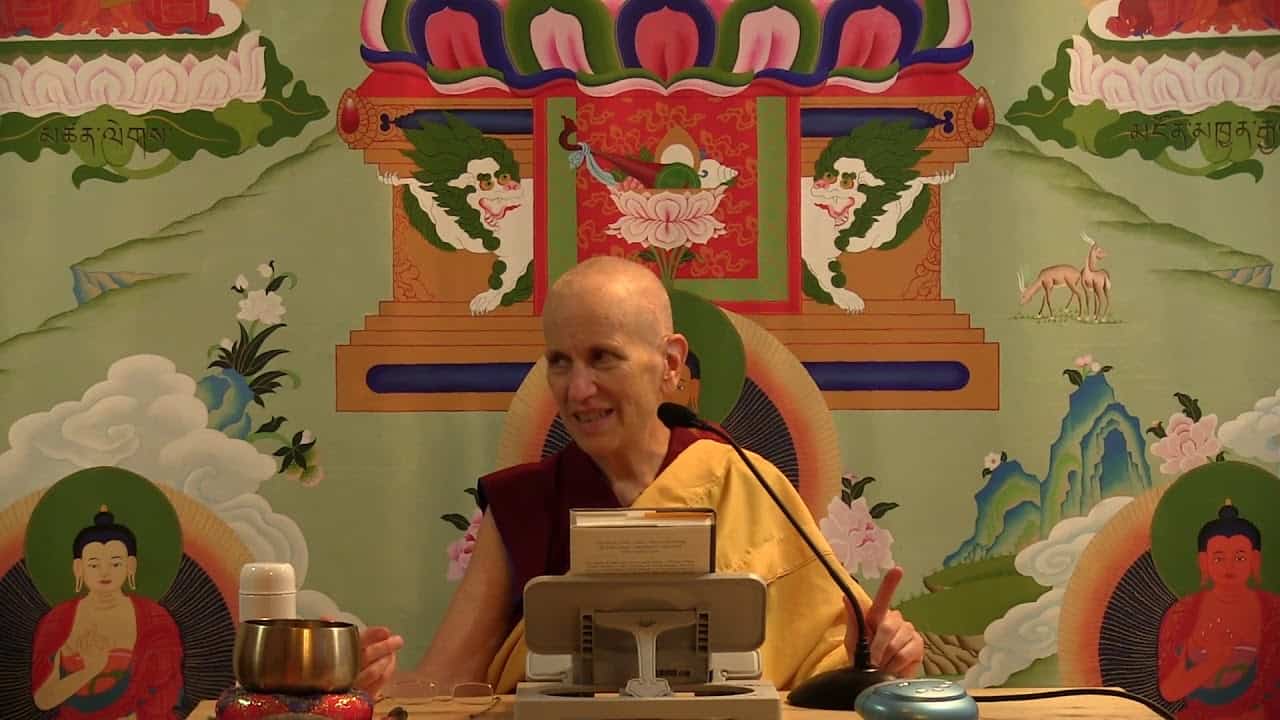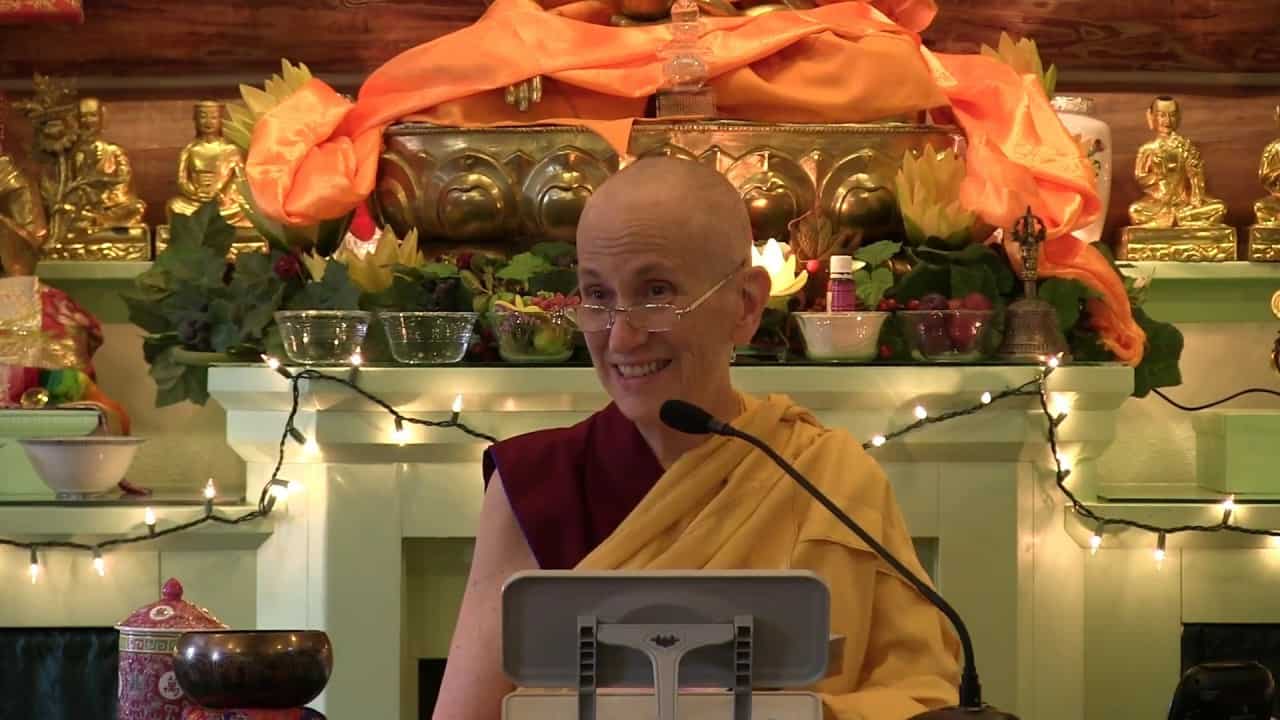Antidote for multiple mood swings in a day
Antidote for multiple mood swings in a day
Part of a series of short Bodhisattva’s Breakfast Corner talks on Langri Tangpa’s Eight Verses of Thought Transformation.
- Comparing the changes of the weather to our mood swings
- Continuing commentary on verse three of the Eight Verses of Thought Transformation
As we know, impermanence was the Buddha’s first teaching and his last teaching. I was thinking we’ve seen a very good example of it today. When I woke up it was raining and I thought, “Oh, it’s Offering Service Saturday, nobody’s going to come, because it’s going to rain all day. But rain is good, we need rain, so….”
Then, 9:00, I come, and all these people are here, and it’s not raining, it’s just kind of foggy, but everybody’s in good spirits.
Then the bell rings for lunch and I look outside and it’s sunny. Within a very short period of time the weather just changed remarkably.
I was thinking, it’s like that with our moods. We can start out in one mood at the beginning of the day, and then an hour or two later we’re in another mood, and a few hours after that we’re in another mood. Some people wake up kind of groggy in bad moods and it takes them a while, so they go–like this morning–from the rain, to the fog, to sunshine. Some people may go the opposite. Some people start out with the sunshine and go otherwise. And some people go up and down and up and down all the time.
We really aren’t very consistent beings. We like to think of ourselves as consistent. We certainly want other people to be consistent. But none of us are. Are we? We’re predictably unpredictable.
It’s that whole thing of impermanence and us not being able to control everything that’s going on in our environment, let alone inside of ourselves.
I’ve been going through the Eight Verses of Thought Training, and the third verse:
In all actions I will examine my mind
And the moment a disturbing attitude arises
Endangering myself and others
I will firmly confront and avert it.
In that verse we really talk about one of the chief things to meditate on, especially when attachment, or greed, or longing, yearning, or ambition, or arrogance for something we’ve attained comes into our mind. One of the best antidotes to reflect on is impermanence, because, like the weather, changing all the time, and our moods changing all the time, so are whatever objects we’re attached to, whatever positions we’re holding onto, whatever achievement that we’re proud of. All of these kinds of things are transient, and they don’t last very long. So investing our happiness in them is a dead end. It’s not going to get us anywhere in the long term, because these things change, so then our happiness, if it’s reliant on these external things, is also going to change.
What the Buddha’s doing is really teaching us a path of developing inner happiness, inner consistency, so that wherever we go and whoever we’re with, our mind can be peaceful, we can be cheerful and happy. Not happy giddy, but there’s a certain feeling of well-being inside.
Some people think that reflecting on impermanence is really depressing. “Oh, I got this wonderful promotion, but it’s not going to last forever. How depressing. Oh I have this wonderful relationship, but it’s not going to last forever. Oh how depressing. I got my middle-aged red sports car, but it’s going to get old-fashioned and I’m going to go more old-fashioned too…. Oh what’s the use, everything’s changing…. Ugh.” Some people may look at impermanence that way.
Actually, if we reflect on impermanence and we’re aware that things are going to change, then we can greet each new moment with a positive attitude, and we can see something hopeful in each new moment. And instead of, “Oh, I’m losing what I had. I want to cling to it some more…,” just recognizing, “Okay, this separation is what happens, but the future is unknown,” and the future can hold a lot of good things, especially if we’ve dedicated our life to following the law of karma, creating virtue, abandoning nonvirtue.
Remember that impermanence is also what allows us to change so that we can become better human beings, so that we can approach buddhahood. Otherwise, sometimes we look at ourselves and we just think of ourselves as permanent, and of course we have all this negative self-talk, so, “Oh, I’m just permanently a failure. I’m just permanently ugly, nobody’s going to love me. I’m just permanently defective.” And all that stuff is total rubbish. It’s just afflicted thoughts that our mind makes up. If we realize that those thoughts are impermanent, we don’t have to live our life burdened by those thoughts all the time. We can release those thoughts, because, anyway, they are changing all the time. And we’re changing all the time.
The fact of impermanence means we can go in a much better direction than we’re going right now. Accepting impermanence without clinging onto things is really a door to a lot of internal peace. And then thinking, “Oh, in the next moment I can be kinder. In the next moment I can connect with people. In the next moment I can give something.” Then each new moment is kind of fun. And eventually, through practicing, we can really remove all these afflictions from our mind forever. And then you have nirvana, which is a state of lasting peace where it’s not going to go up and down like the weather.
I want to make sure it’s very clear, when we think about external objects and developing attachment for them, thinking that they’re going to make us forever happy, that’s when we use impermanence as an antidote to the attachment. We remember that these objects are not going to last forever, so investing our life and our happiness in them doesn’t make much sense. Doing that should not lead us to feeling like nothing is worthwhile, but take that same idea of impermanence and use it in a good way to know that we can change, that our situation can change, and to not see ourselves as having some kind of fixed negative self-image. But realize that we’re impermanent beings, and throw that negative self-image out, and then be able to greet each new moment with a different mental state, one that’s going to be more productive, more realistic, and more beneficial, and with an attitude that knows that things are going to change, so we don’t get too stuck and sunk into things. I think especially with what’s going on in the country right now, it’s really important to remember this. The situation is not permanent, it’s not stuck, it’s going to change, and we can help it to change.
Venerable Thubten Chodron
Venerable Chodron emphasizes the practical application of Buddha’s teachings in our daily lives and is especially skilled at explaining them in ways easily understood and practiced by Westerners. She is well known for her warm, humorous, and lucid teachings. She was ordained as a Buddhist nun in 1977 by Kyabje Ling Rinpoche in Dharamsala, India, and in 1986 she received bhikshuni (full) ordination in Taiwan. Read her full bio.


